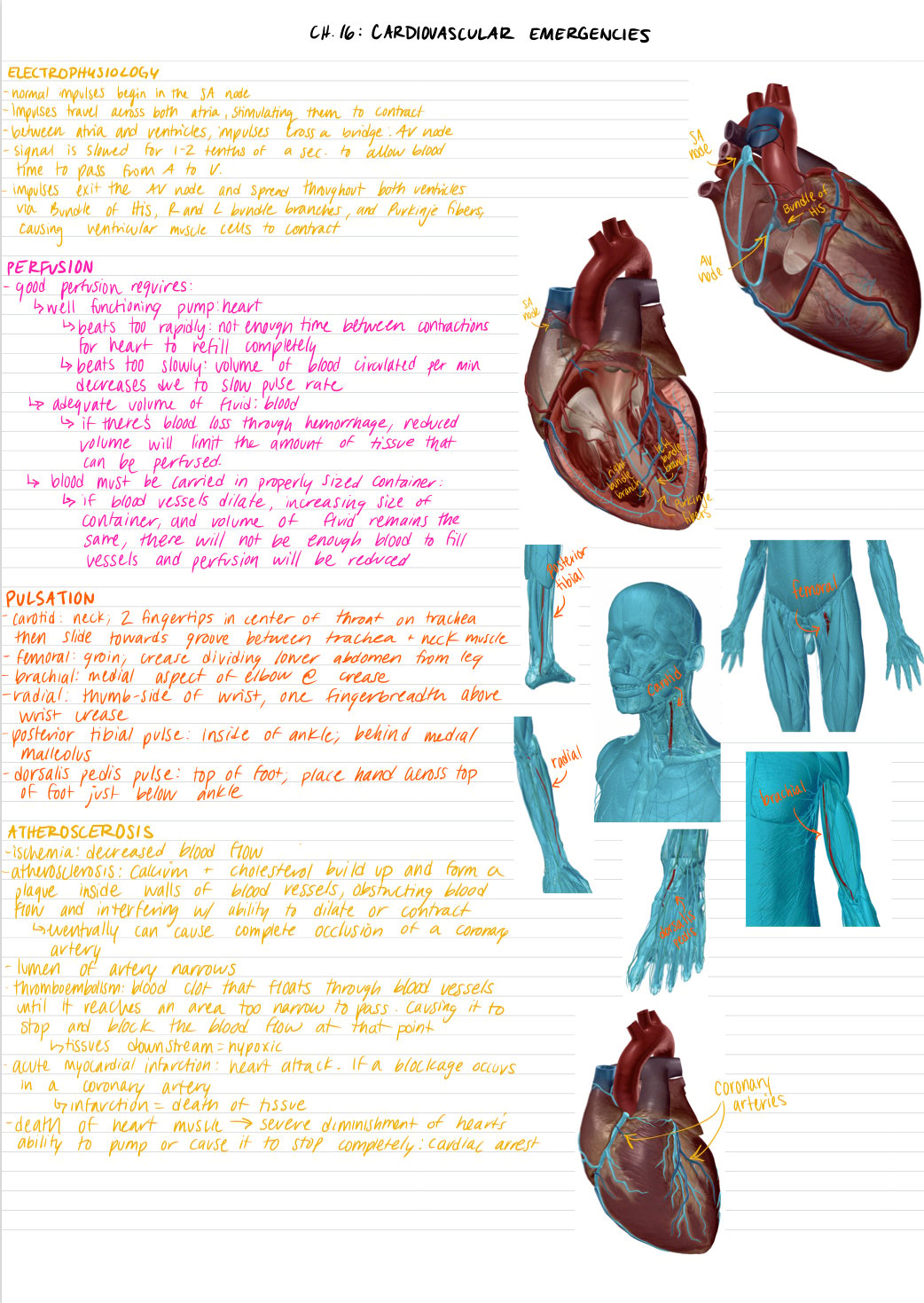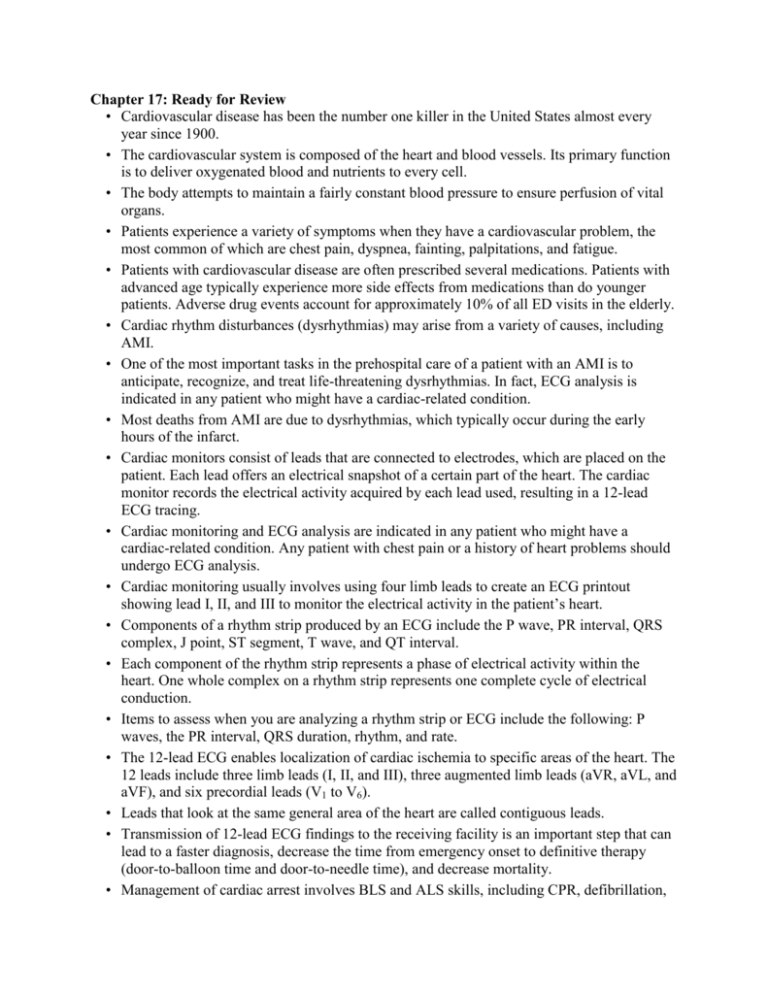Emt Chapter 17 Cardiovascular Emergencies
Emt Chapter 17 Cardiovascular Emergencies - Web chapter 17, cardiovascular emergencies, part one. Web study flashcards on emt ch 17 cardiovascular emergencies at cram.com. Chest pain is a common complaint heard by the emt, but not all chest pain is cardiac compromise. Normally it's 120/80 (higher in the elderly. Acute coronary syndrome (acs) a group of signs and symptoms resulting. Which of these statements made by the patient. Acute coronary syndromes is an umbrella term. The pressure in the arterial system when the heart contracts. the. Web causes of cardiac compromise signs of congestive heart failure • mild to severe confusion • anxiety • increased respiration. 5.0 (23 reviews) a dissecting aortic aneurysm.
Q cardiovascular disease is the. Web q two of the most common cardiac emergencies are heart attack and cardiac arrest. Web 1) it causes the heart rate to decrease, which relaxes it and decreases pain. 2) it dilates the blood vessels, which. Quickly memorize the terms, phrases and. Normally it's 120/80 (higher in the elderly. Web chapter 17, cardiovascular emergencies, part one. Web causes of cardiac compromise signs of congestive heart failure • mild to severe confusion • anxiety • increased respiration. 5.0 (23 reviews) a dissecting aortic aneurysm. Chest pain is a common complaint heard by the emt, but not all chest pain is cardiac compromise. You connect the aed, push the analyze button and.
Web q two of the most common cardiac emergencies are heart attack and cardiac arrest. 5.0 (23 reviews) a dissecting aortic aneurysm. Which of these statements made by the patient. Web study flashcards on emt ch 17 cardiovascular emergencies at cram.com. Acute coronary syndrome (acs) a group of signs and symptoms resulting. Web chapter 17, cardiovascular emergencies, part one. Acute coronary syndromes is an umbrella term. Normally it's 120/80 (higher in the elderly. The pressure in the arterial system when the heart contracts. the. Web 1) it causes the heart rate to decrease, which relaxes it and decreases pain. 2) it dilates the blood vessels, which.
Chapter 17, Cardiovascular Emergencies, Part two YouTube
21k views 3 years ago. Q cardiovascular disease is the. Acute coronary syndrome (acs) a group of signs and symptoms resulting. You connect the aed, push the analyze button and. The pressure in the arterial system when the heart contracts. the.
EMT School and Certification Using Human Anatomy Atlas to Learn and Study
Which of these statements made by the patient. You connect the aed, push the analyze button and. 5.0 (23 reviews) a dissecting aortic aneurysm. Web chapter 17, cardiovascular emergencies, part one. Web causes of cardiac compromise signs of congestive heart failure • mild to severe confusion • anxiety • increased respiration.
Cardiovascular Emergencies by American College of Emergency Physicians
Quickly memorize the terms, phrases and. Chest pain is a common complaint heard by the emt, but not all chest pain is cardiac compromise. Web q two of the most common cardiac emergencies are heart attack and cardiac arrest. Acute coronary syndromes is an umbrella term. Web 1) it causes the heart rate to decrease, which relaxes it and decreases.
PEC Chapter 17 Cardiovascular Emergencies YouTube
Web q two of the most common cardiac emergencies are heart attack and cardiac arrest. Web 1) it causes the heart rate to decrease, which relaxes it and decreases pain. 2) it dilates the blood vessels, which. Chest pain is a common complaint heard by the emt, but not all chest pain is cardiac compromise. Acute coronary syndrome (acs) a.
EMT Review Cardiovascular Emergencies Explained YouTube
21k views 3 years ago. 5.0 (23 reviews) a dissecting aortic aneurysm. Q cardiovascular disease is the. Chest pain is a common complaint heard by the emt, but not all chest pain is cardiac compromise. The pressure in the arterial system when the heart contracts. the.
Cardiovascular Emergencies Lecture 4 YouTube
Acute coronary syndrome (acs) a group of signs and symptoms resulting. Web chapter 17, cardiovascular emergencies, part one. Acute coronary syndromes is an umbrella term. Q cardiovascular disease is the. Normally it's 120/80 (higher in the elderly.
Chapter 17 Cardiovascular Emergencies YouTube
21k views 3 years ago. Web causes of cardiac compromise signs of congestive heart failure • mild to severe confusion • anxiety • increased respiration. Normally it's 120/80 (higher in the elderly. 5.0 (23 reviews) a dissecting aortic aneurysm. You connect the aed, push the analyze button and.
Chapter 17 Cardiovascular Emergencies
Web causes of cardiac compromise signs of congestive heart failure • mild to severe confusion • anxiety • increased respiration. Web q two of the most common cardiac emergencies are heart attack and cardiac arrest. The pressure in the arterial system when the heart contracts. the. Chest pain is a common complaint heard by the emt, but not all chest.
Ch 16 Cardiovascular Emergencies YouTube
Quickly memorize the terms, phrases and. Q cardiovascular disease is the. 21k views 3 years ago. 5.0 (23 reviews) a dissecting aortic aneurysm. Acute coronary syndrome (acs) a group of signs and symptoms resulting.
Ch 17 Cardiovascular Emergencies Part 1 YouTube
Web q two of the most common cardiac emergencies are heart attack and cardiac arrest. Web causes of cardiac compromise signs of congestive heart failure • mild to severe confusion • anxiety • increased respiration. Web chapter 17, cardiovascular emergencies, part one. Quickly memorize the terms, phrases and. 5.0 (23 reviews) a dissecting aortic aneurysm.
The Pressure In The Arterial System When The Heart Contracts. The.
Quickly memorize the terms, phrases and. 21k views 3 years ago. Web study flashcards on emt ch 17 cardiovascular emergencies at cram.com. Web 1) it causes the heart rate to decrease, which relaxes it and decreases pain. 2) it dilates the blood vessels, which.
Web Q Two Of The Most Common Cardiac Emergencies Are Heart Attack And Cardiac Arrest.
Acute coronary syndromes is an umbrella term. Which of these statements made by the patient. Normally it's 120/80 (higher in the elderly. You connect the aed, push the analyze button and.
5.0 (23 Reviews) A Dissecting Aortic Aneurysm.
Web causes of cardiac compromise signs of congestive heart failure • mild to severe confusion • anxiety • increased respiration. Q cardiovascular disease is the. Chest pain is a common complaint heard by the emt, but not all chest pain is cardiac compromise. Acute coronary syndrome (acs) a group of signs and symptoms resulting.









